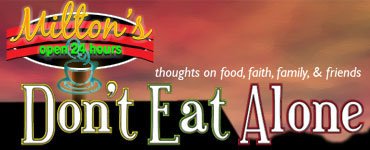lots to learn
I love watching Top Chef.
I’m particularly intrigued by the scenarios the contestants are forced to face, which often call forth skills beyond cooking that they may or may not have. A couple of weeks ago, the episode was called “Restaurant Wars” and the eight remaining contestants were divided into two teams and given the challenge to open their own restaurant for one evening. The two chefs who won the opening “Quick fire Challenge” became the leaders, though neither of them were actually leaders. Both restaurants suffered as a result. Ultimately, the reason one chef who was asked “to pack her knives and go” was not because of her cooking but because she didn’t lead her crew.
“If you’re the chef, you have to act as though no one else is going to do their job,” one of the judges said to her.
I understood exactly what he meant. In a job that depends on everyone doing their part, you have to be prepared in case someone doesn’t come through. At the same time, however, you have to trust each other – even depend on each other as though everyone is going to do excellent work. When both things are held in creative tension, good food happens.
One of the reasons I’ve never made a good Calvinist is I believe people will rise to the level of trust you put in them. When I took kids to youth camp as a youth minister, our “rules” consisted of, “Live, act, and speak like the children of God that you are.” And they did. I took the same basic approach as a high school teacher and now as a chef it’s the way I choose to relate to the folks on the line with me.
I have two guys who alternate nights working with me at the Duke restaurant. One, Abel, I have written about before. The best way I can communicate his approach to his job is to recount what happened the other night. We had some fresh trout to sell that evening, which we were going to dip in an almond crust and fry. As he was getting ready for the dinner service, he said, “I’m going to cook the best trout they have ever tasted.”
And he did.
The other cook who works with me is capable, diligent, yet he lacks the passion Abel articulated. I don’t know his story. I don’t know what has hardened him. I do know it feels to me like he comes to work on an assembly line. I don’t think he gets much joy out of his work. He is filling orders more than he is feeding people. I don’t know how to help him. You can teach technique but you can’t teach passion.
That last realization calls me to live in yet another creative tension, between the poles of my own passion for excellence in what we are doing and my responsibility as both his supervisor and a human being to find a way to look at him that is something more constructive than judgmental. I may not be able to teach passion, but I can learn not to write him off.
Right?
I’m reminded of something my first therapist said to me: “The two things you can change in a situation are what you do and what you say.” I can’t make Cook #2 be different than he is; I can choose to be more creative in the way I deal with him, which means acting my way feeling something other than frustrated. Perhaps I can act and speak in a way that offers him the opportunity to feel something other than frustrated, as well.
The contrast from night to night for me is palpable. Abel comes to work and he is full of energy and intentionality. He and I like each other and we work well together. We have done so long enough now that we know how to help one another, even anticipate one another, when we are on the line together. Abel has risen to the trust I put in him from the beginning. On the alternate nights, I’m working with someone I don’t know as well, with whom I have not worked as much, and who doesn’t exude the same energy and intentionality. He is more dutiful than creative. He doesn’t appear to be interested in more of a relationship than is required to get through the evening.
I’m the chef. It’s my job is to work with both of them to create consistency both in our kitchen and in the food that comes out of it, which means, as much as anything, I have to go to work everyday looking to learn and seeking to rise to the level of trust that has been put in me.
And I still have a lot to learn.
Peace,
Milton
P. S. -- There's a new recipe (finally).









